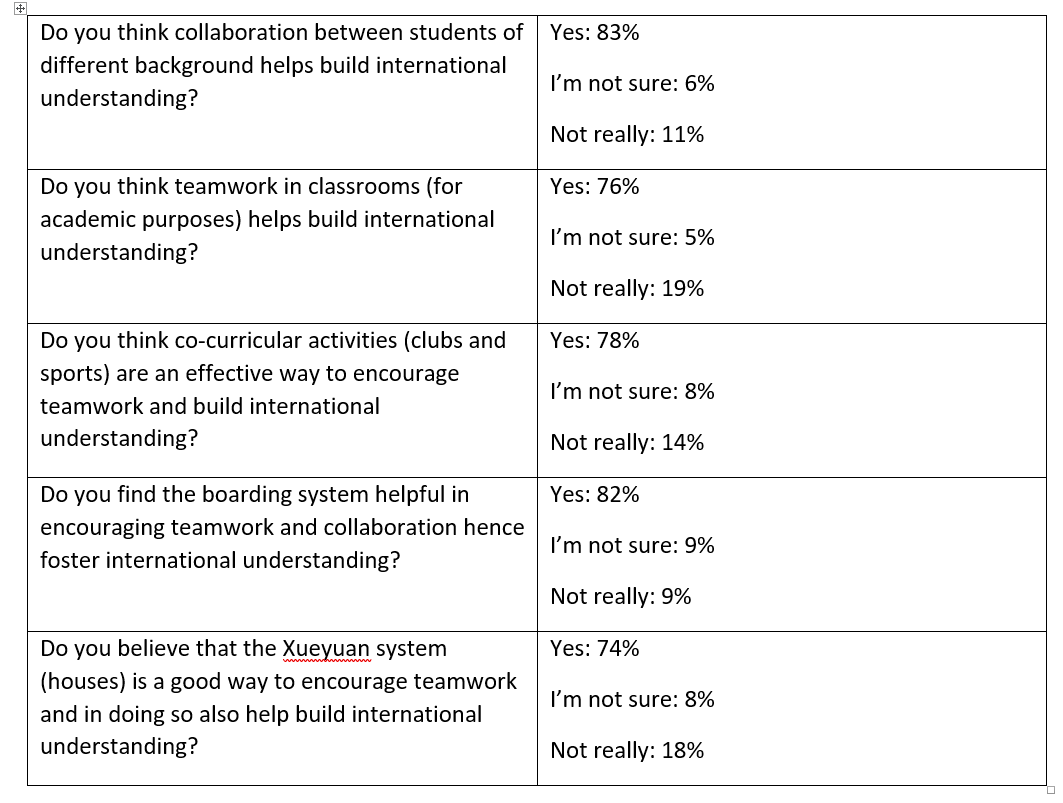Developing International Understanding with teamwork
Authored by: Thomas Weifeng Zhu and Sammi Lu from YK Pao School, Shanghai, China
Summary
Through the interview process, students recognise international academic programs (IGCSE and IB), sports and their competitive opportunities, performing arts and other club and co-curricular activities, as well as the Xueyuan system to be the outstanding opportunities to practice their teamwork skills and improve their international understanding. The process of working with familiar people collaboratively to tackle the challenge of becoming internationally aware is a very effective first step. The strong emphasis in both academic programs and social atmosphere are crucial to the development of students’ international awareness, as it is necessary to become comfortable in an international environment both academically and leisurely. Opportunities created within the school community that raises students’ awareness of global issues, culture, events and opinions prepare students with an international mind set and open-mindedness to accepting various perspectives and become global citizens.
Process
In order to begin the research process, a definition of teamwork that links to the goal of building international understanding has to be first established. Which is collaborations between students of different cultural backgrounds. With this in mind, the research of how approaches of teamwork helps the formulation of holistic international understanding in school began.
Analysis
The idea of holistic arose from initial interview with students, who highlighted the issue of a separation between the social aspect and the academic aspects of international understanding. The predominantly Chinese student population and the Western centric education system meant that the social aspects are most commonly Chinese, whereas the academic aspects are most commonly American and British. However, team work can be effective in breaking these established frameworks and collaboration between students of various background is identified as an important factor in creating international understanding for both the social and academic aspects.
In terms of students’ social life, the school’s co-curricular activities are regarded as a successful approach in building international understanding. Sports, in which students are required to play together as a team, provided an opportunity for students of various backgrounds to bond and discuss the common topic of sports. Furthermore, sports like Cricket and Martial Arts are especially helpful in building students’ international understanding. Continuing with the example of cricket, students and teachers from England, New Zealand, Hong Kong and mainland China are able to bond together through playing as teammates. This teamwork in sports help students to understand each other’s culture and formulate international understanding from the perspective of sports. Quoting one of our interviewees’, an international student from the United States, participation in varsity basketball league games has allowed him to “learn about the divergence of how different cultures approach the same sport differently”, which learning the basketball terminologies in Chinese from his teammates really helped.
Other than sports, clubs are also a platform for teamwork that allows students to gain international understanding. Through working together on different projects, students are able to see perspectives from various backgrounds, and the resulting project will have encompassed inputs from multiple cultures, and in doing so, learn about each other’s way of thinking. For instance, the model UN club in an outstanding example of how teamwork helps build international understanding. From discussing contemporary issues around the world, various perspectives will be layout out for discussion and students will be able to gain an understanding of each other’s perspectives. This is enhanced by competitions outside of school, where students are exposed to a greater number of individuals from more diverse backgrounds.
Through researching on the School’s co-curricular activities, it became clear that providing platforms to encourage students in collaborating and communicating with each other is crucial in building international understanding. Our strong performing arts program that includes annual musicals, student-led theatre performances in both English and Chinese, as well as improvisation clubs. With semester-long regular rehearsals and students taking part as actors, directors, stage designers, light and sound technicians, the collaboration between roles not only practice their teamwork skills, but to gain a better understanding of the international significance of the plays, which are mostly classic theatrical work of the West, through recreating it on our own. Meanwhile, other clubs such as the WeeStudios Design Laboratory and the Pao Student News collaboratively work to produce posters for school events and weekly newspaper that report, interview and reflect. The teamwork allows students to not only practice their visual presentation skills and language skills to effectively communicate, but through their content presented that include celebrations of different cultures and backgrounds and discussion of world events, form a better international understanding as well.
Academically, team work is also helpful in building student’s international understanding. As previously mentioned, our curriculum of IGCSE and IB are designed with international understanding in mind, but at times they remain rather Euro and American centric. Therefore, opportunities of teamwork allow students to discuss and see academic content with their own perspective and learn about another students’ perspective. For instance, in Economics, students are encouraged to make parallels between the studied content and their home country. When these views are exchanged through teamwork, students are able to see the different perspectives which strengthens their international understanding. For the Theory of Knowledge component of IB’s core requirements, students are required to complete a presentation that deconstructs a real-life situation into sophisticated analysis of a knowledge question looking from different academic discipline’s perspectives. Although this presentation can be conducted individually or as a group, our school has encouraged us all to form groups to not only allow our individual mind-set as students of particular subjects to collide, but also obtain a better international understanding of IB’s requirements and the concepts in TOK that would be beneficial for our future pursuit of knowledge. To enable a better grasp of subject knowledge and produce the best quality Internal Assessments for submission to the IBO, our Geography department also arranges yearly trips of geography students to Thailand for local experimentation to collect data together to students’ IA write-up, applying their textbook knowledge into practical collaboration to understand the issues with the natural landscape that needs our global awareness to develop.
Our Xueyuan system (“Xueyuan” is the Chinese for House) that divides all students into four houses according to seasons (spring, summer, autumn and winter) since primary school has also established a strong team spirit within our students. The regularly arranged house competitions and activities including dressing up for Halloween, Book Week and donations to the Movember event that calls for awareness for men’s health are all events with international significance, which our school employs the strong Xueyuan team spirit to activate students’ participation to raise their awareness of such global events.
Sharing of Data

Codes
- Participation in school-based performing arts programs
- Design and emphasis in academic programs
- Participation in athletic competitions
- Build-up of community-based team spirit
- Celebration of events with cultural diversity through participation and communication
Conclusion
Through research in our school, it is clear that teamwork skills are particularly significant to develop our generation’s international understanding, as it builds a platform for collaboration to occur, enabling the sharing of different perspectives and through a combined effort of a group, makes the tackling process of an unfamiliar culture or background significantly more approachable and understandable. As global citizens of the future, the expectation of us to be globally aware is best started in the form of teamwork with people we are familiar with, which will build the skills and open-mindedness required for larger steps to be taken.
